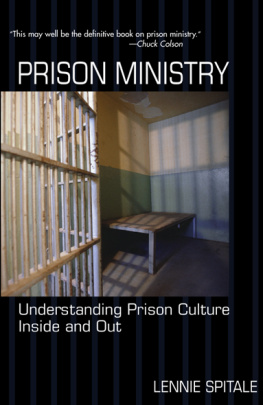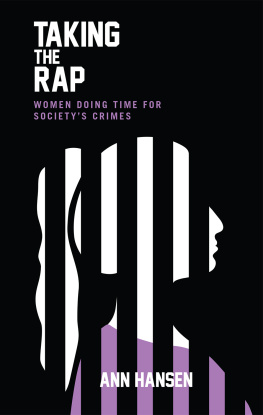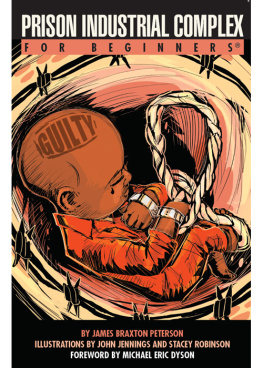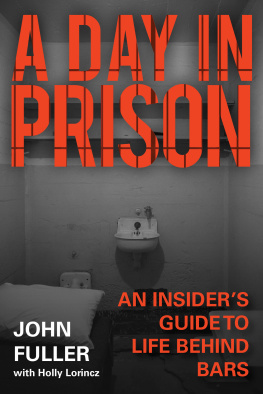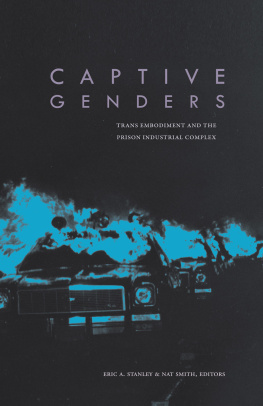Linda Evans - The Prison-Industrial Complex & the Global Economy
Here you can read online Linda Evans - The Prison-Industrial Complex & the Global Economy full text of the book (entire story) in english for free. Download pdf and epub, get meaning, cover and reviews about this ebook. year: 2009, publisher: PM Press, genre: Politics. Description of the work, (preface) as well as reviews are available. Best literature library LitArk.com created for fans of good reading and offers a wide selection of genres:
Romance novel
Science fiction
Adventure
Detective
Science
History
Home and family
Prose
Art
Politics
Computer
Non-fiction
Religion
Business
Children
Humor
Choose a favorite category and find really read worthwhile books. Enjoy immersion in the world of imagination, feel the emotions of the characters or learn something new for yourself, make an fascinating discovery.

- Book:The Prison-Industrial Complex & the Global Economy
- Author:
- Publisher:PM Press
- Genre:
- Year:2009
- Rating:5 / 5
- Favourites:Add to favourites
- Your mark:
- 100
- 1
- 2
- 3
- 4
- 5
The Prison-Industrial Complex & the Global Economy: summary, description and annotation
We offer to read an annotation, description, summary or preface (depends on what the author of the book "The Prison-Industrial Complex & the Global Economy" wrote himself). If you haven't found the necessary information about the book — write in the comments, we will try to find it.
The Prison-Industrial Complex & the Global Economy — read online for free the complete book (whole text) full work
Below is the text of the book, divided by pages. System saving the place of the last page read, allows you to conveniently read the book "The Prison-Industrial Complex & the Global Economy" online for free, without having to search again every time where you left off. Put a bookmark, and you can go to the page where you finished reading at any time.
Font size:
Interval:
Bookmark:

PM PRESS PAMPHLET SERIES
0001: BECOMING THE MEDIA: A CRITICAL HISTORY OF CLAMOR MAGAZINE |
0002: DARING TO STRUGGLE, FAILING TO WIN: THE RED ARMY FACTIONS 1977 CAMPAIGN OF DESPERATION |
0003: MOVE INTO THE LIGHT: POSTSCRIPT TO A TURBULENT 2007 |
0004: THE PRISON-INDUSTRIAL COMPLEX AND THE GLOBAL ECONOMY |
0005: ABOLISH RESTAURANTS |
0006: SING FOR YOUR SUPPER: A DIY GUIDE TO PLAYING MUSIC, WRITING SONGS, AND |
0007: PRISON ROUND TRIP |
PM Press Pamphlet Series No. 0004
The Prison-Industrial Complex and the Global Economy
By Eve Goldberg and Linda Evans
ISBN: 978-1-60486-043-6
Copyright 2009 Eve Goldberg and Linda Evans
This edition copyright 2009 PM Press
All Rights Reserved
Originally published in 1998 by Agit Press
PM Press
Po Box 23912
Oakland, CA 94623
www.pmpress.org
Layout and Design: Daniel Meltzer
Printed in Oakland, CA on recycled paper with soy ink.
The following updated prison information and statistics taken from a 12/07 justice department report were provided by BO (r.d. brown).
The u.s. prison populations explosion is an ever growing cancer: 7 MILLION peopleone in every 32 adultsare behind bars. Of those, 2.2 million are in jail; more than 4.1 million are on probation; and almost 1 million are on parole.
The rate of imprisonment for women continues to grow at a faster pace than for males; though the women are still less than 3% of the total. Misguided (or perhaps purposeful) policies that create harsher sentences for non-violent drug crimes are responsible for this ridiculous rise. From 19952003 prisoner population in federal prisons increased by 49%. Racial disparity (phrase of the new language for racism) also continues. In the 2529 age group, close to 9% or 1 in 13 Black men are prisoners; compared with 2.6% Latino/Hispanic men and 1.1% for white men. Black women are twice as likely as Latinas and three times as likely as white women to be in prison. Therefore, the information in these few pages should be required reading for everyone. The importance of understanding the P.I.C. is learning how not to run a country, and we must know this in order to create a different world for the planet and for ourselves. History does not have to repeat itself. We must begin today to think differently and to certainly act differently or we will continue to destroy our tomorrow.
by Chrystos
the guard growls, Whats this?!
Poetry, I answer, just Poetry
He waves me through
with a yawn
that delights me
So I smuggle my words in
to the women
who bite them chewing starving
Im honored to serve them
bring color music feelings
into that soul death
Smiling as I weep
for Poetry who has such a bad reputation
Shes boring, unnecessary, incomprehensible
obscure, effete
The perfect weapon
for this sneaky old war horse
to make a rich repast of revolution
for Linda Evans
Over 1.8 million people are currently behind bars in the United States. This represents the highest per capita incarceration rate in the history of the world. In 1995 alone, 150 new U.S. prisons were built and filled.
This monumental commitment to lock up a sizeable percentage of the population is an integral part of the globalization of capital. Several strands converged at the end of the Cold War, changing relations between labor and capital on an international scale: domestic economic decline, racism, the U.S. role as policeman of the world, and growth of the international drug economy in creating a booming prison/industrial complex. And the prison-industrial complex is rapidly becoming an essential component of the U.S. economy.
Like the military/industrial complex, the prison-industrial complex is an interweaving of private business and government interests. Its two-fold purpose is profit and social control. Its public rationale is the fight against crime.
Not so long ago, communism was the enemy and communists were demonized as a way of justifying gargantuan military expenditures. Now, fear of crime and the demonization of criminals serve a similar ideological purpose: to justify the use of tax dollars for the repression and incarceration of a growing percentage of our population. The omnipresent media blitz about serial killers, missing children, and random violence feeds our fear. In reality, however, most of the criminals we lock up are poor people who commit nonviolent crimes out of economic need. Violence occurs in less than 14% of all reported crime, and injuries occur in just 3%. In California, the top three charges for those entering prison are: possession of a controlled substance, possession of a controlled substance for sale, and robbery. Violent crimes like murder, rape, manslaughter and kidnapping dont even make the top ten.
Like fear of communism during the Cold War, fear of crime is a great selling tool for a dubious product.
As with the building and maintenance of weapons and armies, the building and maintenance of prisons are big business. Investment houses, construction companies, architects, and support services such as food, medical, transportation and furniture, all stand to profit by prison expansion. A burgeoning specialty item industry sells fencing, handcuffs, drug detectors, protective vests, and other security devices to prisons.
As the Cold War winds down and the Crime War heats up, defense industry giants like Westinghouse are re-tooling and lobbying Washington for their share of the domestic law enforcement market. Night Enforcer goggles used in the Gulf War, electronic Hot Wire fencing (so hot NATO chose it for high-risk installations), and other equipment once used by the military, are now being marketed to the criminal justice system.
Communication companies like AT&T, Sprint, and MCI are getting into the act as well, gouging prisoners with exorbitant phone calling rates, often six times the normal long distance charge. Smaller firms like Correctional Communications Corp., dedicated solely to the prison phone business, provide computerized prison phone systems, fully equipped for systematic surveillance. They win government contracts by offering to kick back some of the profits to the government agency awarding the contract. These companies are reaping huge profits at the expense of prisoners and their families; prisoners are often effectively cut off from communication due to the excessive cost of phone calls.
One of the fastest growing sectors of the prison-industrial complex is private corrections companies. Investment firm Smith Barney is a part owner of a prison in Florida. American Express and General Electric have invested in private prison construction in Oklahoma and Tennessee. Correctional Corporation Of America, one of the largest private prison owners, already operates internationally, with more than 48 facilities in 11 states, Puerto Rico, the United Kingdom, and Australia. Under contract by government to run jails and prisons, and paid a fixed sum per prisoner, the profit motive mandates that these firms operate as cheaply and efficiently as possible. This means lower wages for staff, no unions, and fewer services for prisoners. Private contracts also mean less public scrutiny. Prison owners are raking in billions by cutting corners which harm prisoners. Substandard diets, extreme overcrowding, and abuses by poorly trained personnel have all been documented and can be expected in these institutions which are unabashedly about making money.
Font size:
Interval:
Bookmark:
Similar books «The Prison-Industrial Complex & the Global Economy»
Look at similar books to The Prison-Industrial Complex & the Global Economy. We have selected literature similar in name and meaning in the hope of providing readers with more options to find new, interesting, not yet read works.
Discussion, reviews of the book The Prison-Industrial Complex & the Global Economy and just readers' own opinions. Leave your comments, write what you think about the work, its meaning or the main characters. Specify what exactly you liked and what you didn't like, and why you think so.




